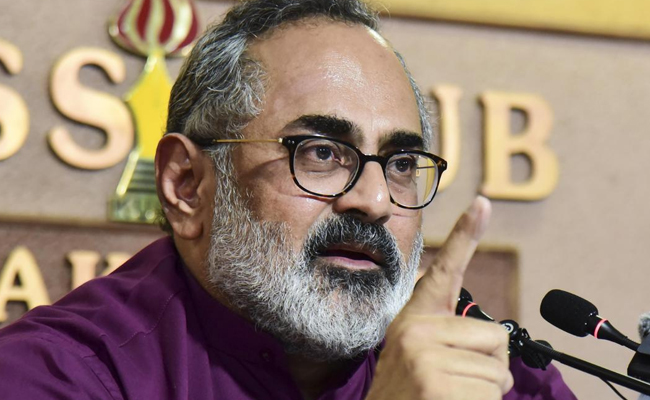New Delhi (PTI): People taken into custody for economic offences should not be handcuffed and clubbed with those arrested for heinous crimes such as rape and murder, a parliamentary committee has recommended.
The Parliamentary Standing Committee on Home Affairs, headed by BJP MP Brijlal, also recommended changes to the Bharatiya Nagarik Suraksha Sanhita (BNSS) on the issue of police custody of an accused beyond the first 15 days from arrest.
The Bharatiya Nagarik Suraksha Sanhita (BNSS-2023) bill was introduced in the Lok Sabha on August 11 along with the Bharatiya Nyaya Sanhita (BNS-2023) and the Bharatiya Sakshya Adhiniyam (BSA-2023) bills.
The three proposed laws seek to replace the Code of Criminal Procedure Act, 1898, the Indian Penal Code, 1860, and the Indian Evidence Act, 1872, respectively.
The parliamentary panel noted that it felt the use of handcuffs, as outlined in Clause 43(3) of the BNSS, is appropriately restricted to select heinous crimes to prevent escape of individuals accused of serious offences and ensure safety of police officers and staffers during arrests.
However, the committee is of the view that "economic offences" should not be included in this category. This is because the term "economic offences" encompasses a wide range of offences -- from petty to serious -- and therefore, it may not be suitable for blanket application of handcuffing in all cases falling under this category.
"The committee, therefore, recommends that Clause 43(3) may be suitably amended to delete the words 'economic offences' from the clause," the panel said.
Clause 43(3) of the BNSS states: "The police officer may, keeping in view the nature and gravity of the offence, use handcuff while effecting the arrest of a person who is a habitual, repeat offender who escaped from custody, who has committed offence of organised crime, offence of terrorist act, drug related crime, or offence of illegal possession of arms and ammunition, murder, rape, acid attack, counterfeiting of coins and currency notes, human trafficking, sexual offences against children, offences against the State, including acts endangering sovereignty, unity and integrity of India or economic offences."
On the issue of police custody of an accused, the committee noted that Clause 187(2) of the BNSS stipulates a total of 15 days for police custody, to be utilised in whole or in parts at any time, during the initial 40 days or 60 days out of the detention period of 60 days or 90 days, as applicable.
However, there is a concern that this clause could be vulnerable to misuse by authorities as it does not explicitly clarify that the custody was not taken in the first 15 days either due to the conduct of the accused or due to extraneous circumstances beyond the control of the investigating officer.
"The committee recommends that a suitable amendment may be brought to provide greater clarity in the interpretation of this clause. The commission also recommends that in Clause 482 of the BNSS, the words 'the accused may be required for police custody beyond the first fifteen days' may be added," it noted.
Under the current Code of Criminal Procedure (CrPC), police custody can be sought and granted only during the first 15 days of detention, for a maximum of 15 days.
The clause stipulates a total of 15 days for police custody, but allows authorities to use this in whole or in parts at any time during the initial 40 days (for offences carrying up to 10 years of punishment) or in the first 60 days (for offences carrying punishment beyond 10 years).
The reports of the parliamentary panel were submitted to the Rajya Sabha on Friday.
Let the Truth be known. If you read VB and like VB, please be a VB Supporter and Help us deliver the Truth to one and all.
Judge cites denial of home to Muslim girl, opposition to Dalit women cooking mid-day meals
Hyderabad, February 23, 2026: Supreme Court judge Justice Ujjal Bhuyan has said that despite repeated affirmations of constitutional morality by courts, deep societal faultlines rooted in caste and religious discrimination continue to shape everyday realities in India.
Speaking at a seminar on “Constitutional Morality and the Role of District Judiciary” organised by the Telangana Judges Association and the Telangana State Judicial Academy in Hyderabad, Justice Bhuyan reflected on the gap between constitutional ideals and social practices.
He cited a recent instance involving his daughter’s friend, a PhD scholar at a private university in Noida, who was denied accommodation in South Delhi after her surname revealed her Muslim identity. According to Justice Bhuyan, the landlady bluntly informed her that no accommodation was available once her religious background became known.
In another example from Odisha, he referred to resistance by some parents to the government’s mid-day meal programme because the food was prepared by Dalit women employed as cooks. He noted that some parents had objected aggressively and refused to allow their children to consume meals cooked by members of the Scheduled Caste community.
Describing these incidents as “the tip of the iceberg,” Justice Bhuyan said they reveal how far society remains from the benchmark of constitutional morality even 75 years into the Republic. He observed that while the Constitution lays down standards of equality and dignity, the morality practised within homes and communities often diverges sharply from those values.
He emphasised that constitutional morality requires governance through the rule of law rather than the rule of popular opinion. Referring to the evolution of the doctrine through judicial decisions, he cited Naz Foundation v Union of India, in which the Delhi High Court read down Section 377 of the Indian Penal Code, holding that popular morality cannot restrict fundamental rights under Article 21. Though the judgment was later overturned in Suresh Kumar Koushal v Naz Foundation, the Supreme Court ultimately restored and expanded the principle in Navtej Singh Johar v Union of India, affirming that constitutional morality must prevail over majoritarian views.
“In our constitutional scheme, it is the constitutionality of the issue before the court that is relevant, not the dominant or popular view,” he said.
Justice Bhuyan also addressed the functioning of the district judiciary, underlining that trial courts are the first point of contact for most litigants and form the foundation of the justice delivery system. He stressed that due importance must be given to the recording of evidence and adjudication of bail matters.
Highlighting the role of High Courts, he said their supervisory jurisdiction under Article 227 of the Constitution is intended as a shield to correct grave jurisdictional errors, not as a mechanism to substitute the discretion or factual appreciation of trial judges.
He recalled that several distinguished judges, including Justice H R Khanna, Justice A M Ahmadi, and Justice Fathima Beevi, began their careers in the district judiciary.
On representation within the judicial system, Justice Bhuyan noted that Telangana has made significant strides in gender inclusion. Out of a sanctioned strength of 655 judicial officers in the Telangana Judicial Service, 478 are currently serving, of whom 283 are women, exceeding 50 per cent representation. He added that members of Scheduled Castes, Scheduled Tribes, minority communities, and persons with disabilities are also represented in the state’s judiciary.
He observed that greater representation of women, marginalised communities, persons with disabilities, and sexual minorities would help make the judiciary more inclusive and reflective of India’s diversity. “The judiciary must represent all the colours of the rainbow and become a rainbow institution,” he said.
Justice Bhuyan also referred to the recent restoration by the Supreme Court of the requirement of a minimum three years of practice at the Bar for entry-level judicial posts. While acknowledging that the requirement ensures practical exposure, he cautioned that its impact on women aspirants, especially those from rural or small-town backgrounds facing social and financial constraints, would need to be carefully observed over time.
Concluding his address, he reiterated that the justice system must strive to bridge the gap between constitutional ideals and lived realities, ensuring that the rule of law remains paramount.




